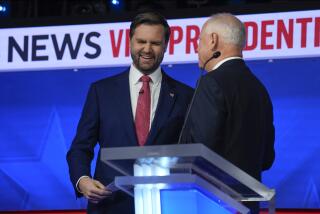A Debate--Without the Campaign
- Share via
DAVIS, Calif. — It hardly seemed a fair fight going in. The matchup pitted the poet laureate of public policy, a Democrat widely celebrated for his epic eloquence, against that most pratfall-prone of politicians, a Republican once scorned for making a mash of the word potato.
For more than two hours, Mario Cuomo and Dan Quayle went head-to-head in a campaign-style debate, fashioned after the serve-and-volley sessions of recent presidential contests.
When the Tuesday night spectacle was over, the much-maligned ex-vice president had pretty much held his own against the florid former New York governor--even if Quayle appeared, at times, to be hanging on for dear life.
The exhibition took place on the floor of the darkened gymnasium at UC Davis. Like many off-season contests, it was entertaining, intriguing and wholly irrelevant to the standings. Even so, for Quayle--who is considered a likely presidential candidate in 2000--the event marked yet another step in the rehabilitative effort he has waged since his disastrous national debut as George Bush’s running mate in 1988.
As the debate got underway, the two men took their marks behind spare wooden lecterns and familiar political positions.
Cuomo, expansive and effusive, poured forth molten passion as he decried a growing gap between rich and poor, attacked the “shameful welfare reform bill” signed by President Clinton and lamented the Democratic drift away from the party’s historic role as defender of the deprived.
Quayle, careful and controlled, heaped dutiful credit on Republicans for everything from the end of the Cold War to the just-concluded budget deal to the volunteerism summit recently convened by Clinton.
If Quayle was no Jack Kennedy, his showing was at the least respectable, though he was briefly bollixed up by a discussion of campaign finance reform.
“A constitutional amendment to limit free speech? No way,” Quayle said, dismissing Cuomo’s call for certain curbs on campaign spending, then ticking off his own set of proposed restrictions.
“You just listed, Mr. Vice President, a whole series of limitations on free speech,” Cuomo shot back. “If it’s a matter of free speech, you can’t limit anybody from giving money to anybody. It’s free speech!”
As Cuomo blustered through a lengthy history of case law, Quayle stood back from his lectern with the same stricken look that became a hallmark of his 1988 campaign.
Ultimately, he surrendered the point by turning the matter back to the moderator, something he wouldn’t dare under more high-stakes circumstance. “I don’t think I’m going to change his mind,” Quayle muttered.
Such missteps aside, one veteran GOP strategist suggested that forums like Tuesday night’s debate would only help Quayle’s prospects.
“Even a former vice president can use whatever attention he gets once he’s out of office,” said Eddie Mahe. “And if you’re Dan Quayle, who has this unfair image as some kind of dunderhead, it can help overcome that allegation. Even if only three people walked out of there and went to the office the next day saying, ‘Geez, that Dan Quayle is pretty sharp,’ it’s a start. And that can’t hurt.”
Judging from some in the audience, Quayle still has a way to go to erase the almost cartoonish image he acquired during his troubled tenure as Bush’s No. 2.
Rita Walensa professed deep admiration for Quayle and the way he “stood up for what he thought” as Bush’s beleaguered understudy. And what did her husband, Bob, think?
“Potatoes?” Mrs. Walensa suggested.
“Yeah, potatoes,” Mr. Walensa nodded, recalling what has surely become the most infamous spelling gaffe in political history.
There was a sizable contingent of Quayle boosters as well, among them John Anthony. “He was treated pretty shabbily,” said Anthony, who came clutching a well-thumbed Bible. “Any time you stand for something good, you take your shots.”
Meeting with reporters beforehand, it was clear that Quayle, too, continues to harbor no small resentment toward the media for his portrayal as a Beltway bumbler and intellectual featherweight.
“If I decide to run for president in the year 2000, you all are going to have to do something rather novel,” he said. “And that is to come out and cover me on a campaign trail, listen to what I have to say, report what I have to say.”
Which, of course, was a purely hypothetical challenge. Deftly, and with an economy of demurrals and standard-issue denials, Quayle insisted it was really far too soon to talk about the 2000 campaign.
Cuomo, in contrast, offered a characteristically prolix account of his rise as a political star on the strength of his electrifying speech to the 1984 Democratic National Convention; about the panting that surrounded his political designs in 1988, and about his highly public agonizing over whether to run in 1992, before he finally allowed as how, no, he would not be a candidate for president in 2000.
Then, again demonstrating his ample skill at ambiguity, Cuomo cracked the door on the prospect of running for the U.S. Senate next year in New York, though he just as quickly downplayed the possibility. “We’ll see,” he concluded, inviting all manner of speculation to start anew.
More to Read
Get the L.A. Times Politics newsletter
Deeply reported insights into legislation, politics and policy from Sacramento, Washington and beyond. In your inbox twice per week.
You may occasionally receive promotional content from the Los Angeles Times.











